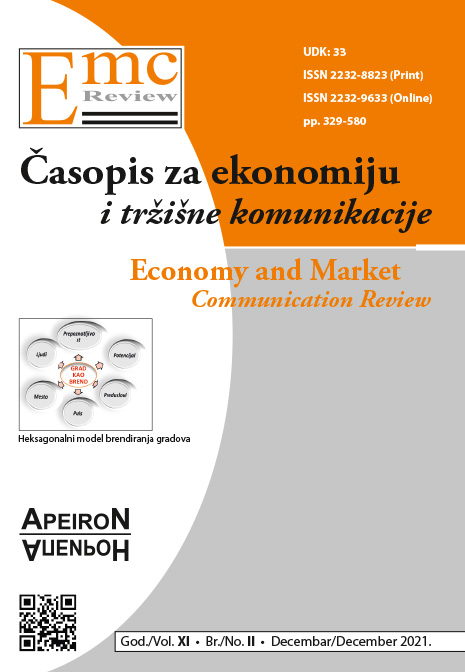SPORTS EVENTS IN THE FUNCTION OF CITY BRANDING AS TOURIST DESTINATIONS
DOI:
https://doi.org/10.7251/EMC2102446NAbstract
Branding is a concept of contemporary business and is considered one of the key elements for positioning products or services in consumers’ minds. A brand should be built on the clear foundation, while continually enforcing the same brand values, visibility and authenticity. The purpose of this paper is to highlight the role of sport events in the process of destination branding. The paper begins with theoretical explanations of the process, models and the importance of destination branding, highlighting the models of city branding with special regard to the importance of organising sport events. The special attention is given to one of the most famous models which measures the attractiveness and the positioning of a city and it is the Anholt’s model City Brands Index (Anholt, 2006) that unifies six aspects of the city and which is based on the previous Hexagonal model of the competitive identity (Anholt, 2002). The research question of this paper is based on how every mentioned element can be improved through the organisation of the sports events in the function of city branding as tourist destinations. The analysis presented in this paper undoubtedly shows that the use of sports events in the function of city branding as tourist destinations is a complex and demanding process that enriches tourist potential of the destination and makes it sustainable in the tourism market. Organising sports events, especially large sports events, can contribute to the improvement of the city’s recognisability in the international environment. Big sports events are making the existing image of the city stronger by adding the new component as the host city of a certain event. In this way, they contribute to the creation of the active image of the city (Xing & Chalip, 2006). There is also an improvement of the sports and accomodation infrastructure of the city after the completion of the events. The pulse of the city gets the new dynamic element, so the sports events are used in the function of rebranding the city like Singapore (Oi, 2015). Regardless if it is the co-branding approach i.e. the application of the first level access of destination accreditation or the organisation of the sport events that emphasise the characteristics of the destination, sports events are the opportunity to emphasise the physical aspects of the city. Organisation gives the opportunity to ‘make what is intangible tangible’ i.e. to display to the visitors the sports spirit of the city and its residents and therefore improve people as the last component of the Anholt’s model of the city branding. In the paper, there are examples of the successful organisation of the sports events in the function of destination branding and the conclusive remarks are given for the application of the sports events in the further practice with a special review on the challenges of destination branding on the grounds of the sports events organisation in the period of the pandemics.
